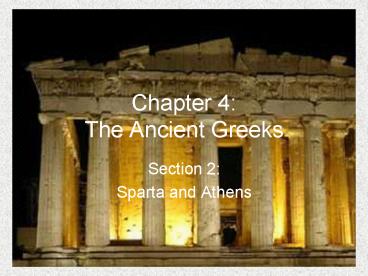Chapter 4: The Ancient Greeks - PowerPoint PPT Presentation
1 / 34
Title:
Chapter 4: The Ancient Greeks
Description:
The Ancient Greeks Section 2: Sparta and Athens ... Spartan girls were trained in sports to become healthy mothers and were freer than other Greek women. – PowerPoint PPT presentation
Number of Views:413
Avg rating:3.0/5.0
Title: Chapter 4: The Ancient Greeks
1
Chapter 4The Ancient Greeks
- Section 2
- Sparta and Athens
2
Daily Focus Skills Transparency 42
Chapter 4
3
Sparta and Athens c. 700 B.C.
4
Tyranny in the City-States
- Nobles, who owned large farms, seized power from
the Greek kings. - Farmers had to borrow money from nobles and often
could not pay back the debt. - The farmers lost their land and had to work for
the nobles or were sold into slavery.
5
Tyranny in the City-States
- Unhappy farmers demanded changes in the power
structure of the city-states. - This unhappiness led to the rise of tyrants, or
people who take power by force and rule with
total authority. - Tyrants overthrew the nobles during the 600s B.C.
6
Tyranny in the City-States
- Tyrants maintained their popularity by building
marketplaces, temples, and walls. - The Greek people eventually tired of the tyrants
and created oligarchies or democracies. - An oligarchy is a form of government in which a
few people hold power.
7
Tyranny in the City-States
- A democracy is a form of government in which all
citizens share power. - Sparta was an oligarchy Athens was a democracy.
8
How are tyrants today different from those in
ancient Greece?
Today the word tyrant means a harsh, oppressive
ruler. Todays tyrants are not concerned with
the common good of their countrys people.
9
Sparta Video Clip
10
Spartan Warriors
11
Spartan Warrior
12
Sparta
- To obtain more land, Spartans conquered and
enslaved their neighbors, calling them helots. - To keep the helots from rebelling, the Spartans
created a strong military of boys and men. - Boys entered the military at age seven.
- At age 20, men entered the regular army and lived
in the barracks for 10 years.
13
Sparta
- They returned home at age 30 but served in the
army until age 60. - Spartan girls were trained in sports to become
healthy mothers and were freer than other Greek
women. - The Spartan government was an oligarchy
containing two branches, a council of elders, and
an assembly.
14
Sparta
- The Spartan government kept foreign travelers out
and discouraged its own citizens from traveling
in order to maintain control of the country.
15
Temple at Sparta Today
16
Sparta Today
17
What was one disadvantage of the Spartans focus
on the military?
They did not learn as much about science or
practice as much trade as Greeks in Athens.
18
Athens
- Boys in Athens attended school to learn reading,
writing, and arithmetic. - Athenian girls learned household duties from
their mothers. - Some wealthy girls learned reading, writing, and
playing the lyre. - The government of early Athens was an oligarchy.
19
Athens
- A noble named Solon reformed the Athenian
government in 594 B.C. - The tyrant Peisistratus seized power 30 years
after Solons reforms. - Cleisthenes took power in 508 B.C
- He created a democracy in Athens.
- Cleisthenes gave the assembly more power
20
Athens
- He also created a new council to help the
assembly carry out its duties. - Members of the council were chosen by lottery.
21
Athena
22
The Agora (ancient city of Athens)
23
Acropolis
24
Why did the people of Athens remain unhappy after
Solons reforms?
Solon refused to give away land of the wealthy
nobles, so the farmers remained unhappy.
25
Athens Video Clip
26
Athens Video Clip-2
27
Section Review Questions
Who were the helots?
The helots were captive workers in Sparta.
28
Section Review Questions
Why did tyrants fall out of favor with the
Greeks?
Most Greeks longed for rule by law with all
citizens participating in government.
29
Section Review Questions
Evaluate Why did Athenians choose officials by
lottery? Would there be drawbacks to this
method? Explain.
They thought elections might favor the
rich. Possible answer The most qualified people
might not be picked.
30
Section Review Questions
Explain How did Greek nobles gain power?
They seized power from kings during the Dark Age.
31
Section Review Questions
Analyze Why was Solon popular among some
Athenian farmers and unpopular among others?
He canceled farmers debts and freed those who
had become enslaved, but he refused to give away
wealthy nobles land.
32
Section Review Questions
Civics Link How did Athenian democracy keep one
person from gaining too much power?
A large council chosen by lottery kept power
distributed among the people.
33
Section Review Questions
Descriptive Writing Imagine that you are a
28-year-old man living in Sparta in 700 B.C.
Write a letter to your 6-year-old nephew telling
him what to expect when he leaves home on his
next birthday.
Your letter should discuss early military
training and the importance of serving Sparta.
34
Section Review Questions
- How would a citizen of Sparta complete this
sentence - Im proud of my city-state because _______.

